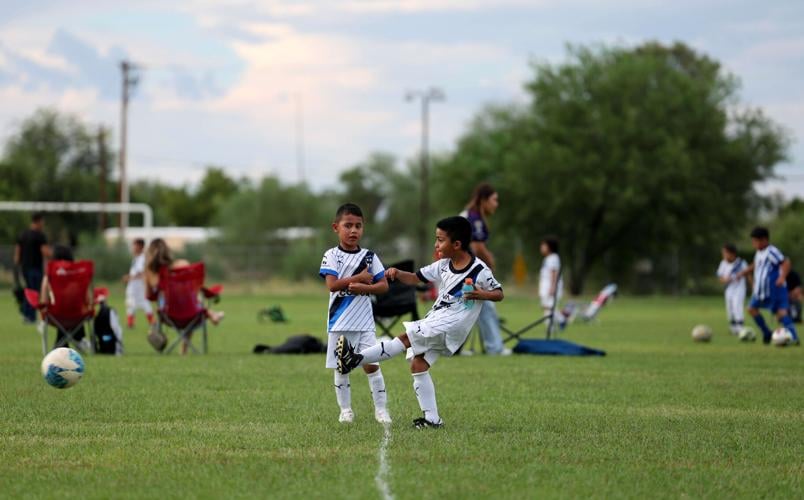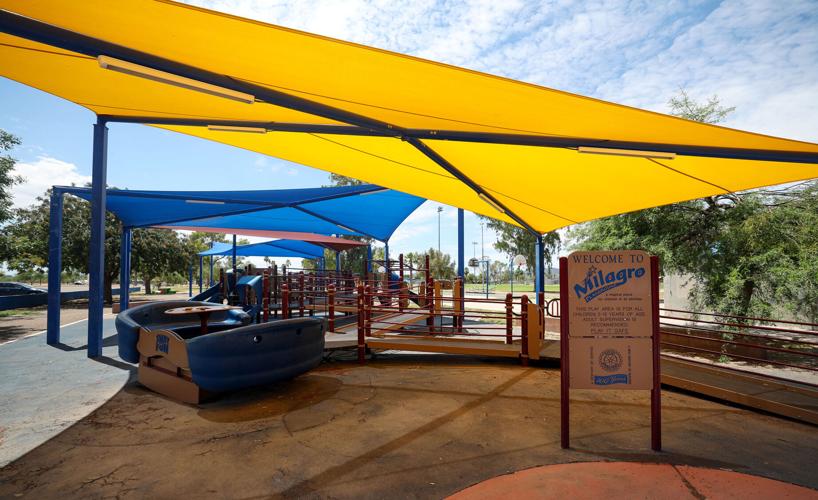Nearly $3 million in federal funding has been awarded to upgrade and renovate a 48-acre park on Tucson’s north side.
Jacobs Park is one of 10 parks across the country that was awarded part of a $46.7 million round of funding from the the U.S. Department of Interior’s Outdoor Legacy Partnership program, the city said Thursday in a news release.
In-total, about $8.4 million in federal and city funds will go toward upgrades for the park, said Lara Hamwey, director of the city’s Parks and Recreation department.
The city already slated about $3.6 million in voter-approved Proposition 407 funds toward improvements in 2022, when the Tucson city council approved the park’s master plan, which lists 41 upgrades for it and nearby Ochoa Soccer Complex.
The remaining funds come from other sources that have been allocated to the park in the last two years, Hamwey said.
Some notable additions coming to the park − located off North Fairfield Avenue and just south of West Prince Road − include a new softball complex, skatepark and two soccer fields, two futsal courts and four pickleball courts, Hamwey told the Star on Friday.
“We had talked about converting an existing concrete slab for (futsal because it) does not exist there right now,” she said. “And that is something that we had a local group come and advocate that activity, and so that’s how we ended up considering that part. We were going to be doing a lot of projects to lend that happening.”
Additionally, according to the city news release, the federal funding for the project will expand Jacobs Park’s dog park on its west side and will “address stormwater infrastructure and plant 310 new shade trees.”
Hamwey says the funding will also allow go towards eliminating a small parking lot on the park’s west side to transform the space into a more “recreation-focused area,” replacing it with a family-use area that will include a new playground, picnic and grill areas, a new restroom and a concessions building.
“You have to kind of navigate through the neighborhoods (nearby) to get to it, so it made sense in looking at the design, to try to creating more of a social gathering space for the neighbors,” she said. “(We’re) eliminating a parking lot that probably isn’t serving a whole lot of people, because (they) don’t know to go through the neighborhood ... and converting it into a family destination, could then allow for, you know, a neighborhood association to do their own little gathering, or make it walkable for family if they want to do something in the park.”
According to the park’s project page, upgrades via Prop. 407 were to be done in phases; the first phase was to be completed by 2022, and the second phase was scheduled to begin last year and run through 2025.
So far, an awning shade has been installed over the Milagro playground on the park’s east side, while renovations to the park’s irrigation system is ongoing. Going forward, most of the second phase of work is going to be dependent on what the final construction timeline will be, Hamwey said.
She said the parks department intentionally paused work on the park when it knew it was going to be applying for this federal grant, and the department was anticipating that it would get notification on whether or not the grant was awarded sometime last fall.
“So, we chose to not put it out for (a) construction bid until we knew exactly how much money we were going to have to spend, so that the scope would be as accurate as possible,” Hamwey told the Star.
Her anticipation is that the department will have a construction bid “out for proposals” and awarded by the end of this year, and will then be looking to break ground in early 2025.
How long construction will take will be determined by the construction company who wins the bid, Hamwey said. Her estimation, from past experience, is that a project like this could take anywhere from a year to about 18 months for completion. But this is just an estimation, she said.
The second phase, according to the park’s master plan, will bring a new walking path at the park, re-surfacing of its four basketball courts and two tennis courts, a new pool deck and “beach entry” at the park’s pool on its south side, among other renovations.
Several upgrades are also scheduled for the Ochoa Soccer Complex, including the walking path around it, renovated playgrounds and restrooms and new pedestrian crossing across Fairview to connect the complex and the park.
The department has already been able to complete some of these planned improvements at the complex ahead of time, Hamwey said, including the lighting on its fields because of “the conditions that they were in.”
“There’s a brand-new playground over on the Ochoa side that we’re trying to work on now,” she says, “so there’s benefits and improvements coming for both.”
Federal funding like what was received helps the city “invest in making sure that all Tucsonans, especially in areas that have experienced historic disinvestment like the Thrive in the ‘05, have access to open space, nature and all of the benefits that come from access to those resources,” Tucson Mayor Regina Romero said.
Councilman Kevin Dahl, who represents the area that includes the park, said that while its a “well-loved park,” wear-and-tear its incurred over the years has made upgrades and renovations necessary.
“This is such good news for neighbors and other Tucson residents who enjoy Jacob Park’s shady green spaces and sports fields,” Dahl said. “I can’t wait to see the repairs, the improvements, and the new facilities better serve the needs of families, sports enthusiasts, picnickers, dog walkers, and others who use the park.”
U.S. Rep. Raúl Grijalva said that he looks forward to seeing “the positive impact these improvements will bring to Jacobs Park and the neighbors in the Thrive in the 05.”
“These improvements are not only physical infrastructure, but an improvement of quality of life for the neighborhood and the city. I have historically supported open spaces, parks, and safe spaces for families in my district,” he said, and that this award “will greatly enhance our mission and will continue to advocate for these resources in greatly needed neighborhoods.”
Prop. 407 was approved by Tucson voters in 2018 and is a city-backed plan to spend $225 million in bonds on the city’s parks and trails over a 10-year period from its approval. From that bond package, as the Star previously reported, funding would go towards improving 100 of the city’s 128 parks, along with sports fields, aquatic facilities like pools and splash pads, as well as bike boulevards and other upgrades throughout the city.





